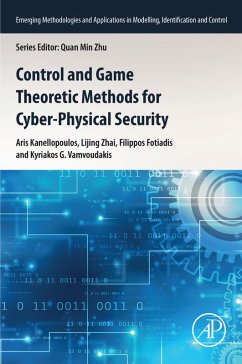This book will be a reference to the research community in identifying approaches to security that go beyond robustification techniques and give attention to the tight interplay between the physical and digital devices of the system, providing algorithms that can be readily used in a variety of application domains where the systems are subject to different kinds of attacks.
- Serves as a bibliography on different aspects of security in cyber-physical systems
- Offers insights into security through innovative approaches, which amalgamate principles from diverse disciplines
- Explores unresolved challenges in the security domain, examining them through the lens of rigorous formulations from control and game theory
Dieser Download kann aus rechtlichen Gründen nur mit Rechnungsadresse in A, B, BG, CY, CZ, D, DK, EW, E, FIN, F, GR, HR, H, IRL, I, LT, L, LR, M, NL, PL, P, R, S, SLO, SK ausgeliefert werden.
Hinweis: Dieser Artikel kann nur an eine deutsche Lieferadresse ausgeliefert werden.









